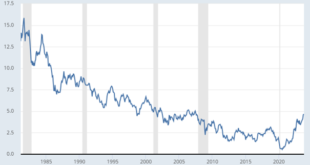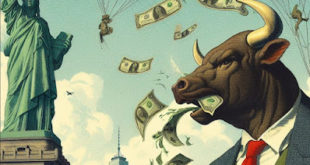Fed up with the state's surveillance regime? There are ways to use available technology to frustrate government efforts to spy on you. Original Article: The Parasitic Rich Men North of Richmond [embedded content] Tags: Featured,newsletter
Read More »The Federal Reserve is Running Losses. Does This Cost Anyone Anything?
Financial statements of the US Federal Reserve, which consists of the board of governors in Washington and twelve district reserve banks across the country, indicate that the consolidated system has generated both capital and operating losses for the past couple of years. The Fed was created in 1913 to issue and circulate an “elastic currency” that could respond to consumers’ demand for cash, end bank runs known then as “money panics,” and serve as a “lender of last...
Read More »The Dollar’s Recovery has been Extended, but it may Give North American Operators a Better Selling Opportunity
Overview: The dollar's sell-off last week was extreme and it recovered yesterday and through the European session today. The Australian dollar has been hit the hardest. It is off more than 1% today after the RBA lifted the cash rate by 25 bp (to 4.35%). Still, the US dollar's gains have stretched intraday momentum indicators, suggesting the upside correction may be nearly over. The greenback's moves appear to have been driven by interest rate expectations. Recall...
Read More »Killers of the Flower Moon Is about Government Failure
Most reviewers of the motion picture Killers of the Flower Moon distill just one lesson from the story: greed is deadly. The love of money leads to evil. But the real lesson should be of government failure. The movie follows the book, Killers of the Flower Moon: The Osage Murders and the Birth of the FBI by David Grann. It tells the story of the Osage tribe during the 1920s oil boom in Oklahoma. Tribal members became very wealthy because of the discovery of oil on...
Read More »The Parasitic Rich Men North of Richmond
Oliver Anthony's popular song, "Rich Men North of Richmond," describes the parasitic world of the Beltway. One hopes people understand the damage the political classes have done. Original Article: The Parasitic Rich Men North of Richmond [embedded content] Tags: Featured,newsletter
Read More »Is Migration a Tool of the Consumptive Class?
Migration is part of the wider concept of economic freedom. This makes it desirable if prosperity is the goal of policy. But more applicable to the current attitudes and values of Western leaders than mundane economic arguments, migration presents an opportunity to increase the pool from which they extract real income. This is required in the face of poor demographics and growing socialistic ambitions. The extraction is achieved by taxation and inflation, which...
Read More »Rothbard, Milei and the New Right in Argentina
Instead of the usual statist candidates, Argentine voters have to opportunity to elect a Rothbardian who is calling for radical free-market changes in the nation's economy. Original Article: Rothbard, Milei and the New Right in Argentina [embedded content] Tags: Featured,newsletter
Read More »The Interest Rate Shock Will Blow Up the Government’s Ponzi Game
In the international fixed-income markets, interest rates are rising, and the decades-long trend of declining bond yields has undoubtedly been broken. On August 2, 2022, the ten-year United States Treasury yield was 0.5 percent; on October 9, 2023, it had risen to 4.8 percent. Long-term interest rates in Europe, Asia, and Latin America have also risen sharply. The key reason for the rise in capital market interest rates is the central banks’ interest rate hikes—a...
Read More »The Dollar Remains Mostly Softer but Near-Term Consolidation is Likely
Overview: The US dollar, which was sold last week after the FOMC and soft employment report, remains on the defensive today. The Antipodean currencies and yen are struggling, but the other G10 currencies are firm. The dollar is also lower against most emerging market currencies. Still, given the magnitude of the dollar's pullback, we suspect some consolidation is likely.Asia Pacific equities rallied, helped by the sharp gains in the US before the weekend. Note that...
Read More »Weekly Market Pulse: Monetary Policy Is Hard
So, is that it? Have rates peaked? Is the long bear market finally over? The market decided last week that interest rates have peaked for this cycle. And if rates have peaked then all the assets that have been pressured over the last two years can finally come up for air. Since October 18, 2021, over two years ago, investors have had few places to hide. Of the major asset classes we follow closely, only two – gold and commodities – were higher by more than a...
Read More » Swiss Economicblogs.org
Swiss Economicblogs.org







